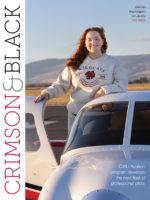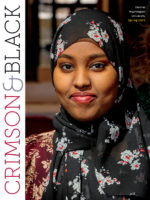
Most people assume that soldiers and diplomats perform entirely different roles in conflict situations. But in the Army, possessing both skill sets is not only advantageous; it’s required.
“There’s a bigger picture, a political dimension referred to as ‘diplomat-soldiers,’” explained Lt. Col. Bonnie Kovatch, CWU’s Army ROTC detachment commander. “When you’re working in a multi-national, international, or joint operation—or even domestically with the work done by the National Guard or reserves—you need to place deliberate effort into harnessing the power of partnerships and relationships.”
Kovatch arrived on campus in 2018 after two years at Supreme Headquarters Allied Powers Europe (SHAPE) in Belgium, where she supported counterintelligence operations within NATO. Her role involved coordinating with 29 nations through Allied Command Counterintelligence to “keep spies from spying on NATO,” as she describes it. She quickly found that diplomatic skills were essential when performing those duties.
“I don’t think we [the Army] could complete our mission if we weren’t diplomatic in our approach,” she said.
Senior Jared Cloud, of Woodland, Washington, served as the Cadet Battalion Commander last year. As the highest-ranking student in the Wildcat Battalion’s command structure, he worked closely with Kovatch, including crafting the organization’s first mission statement.
The Wildcat Battalion is a family that develops courageous leaders to reach their full potential, and Kovatch has been instrumental in the success of those she mentors.
“She amplifies the fact that the military is a people-oriented business,” Cloud said. “No matter what you’re doing, in the Army, there is always going to be a transaction between you and another individual. Her big thing is you have to be a good person first. Because, without being a good person—even if you’re the best leader—you’re much harder to follow as a soldier. It’s how she approaches leadership.”
Kovatch is the first female detachment commander in the CWU Army ROTC program’s 39-year history. The Wildcat Battalion consistently ranks at the top of the 30 schools that comprise the US Army Cadet Command’s 8th Brigade, which includes schools in Washington, Oregon, Idaho, Montana, California, Nevada, Alaska, Hawaii, and Guam.
Kovatch noted that her career path was inextricably linked to an unexpected ROTC deployment with diplomatic ramifications: the 9/11 terrorist attacks.
“I watched my peer cadets, who were members of the New York Army National Guard, get activated to go to New York City and assist there,” recalled Kovatch, who was a junior at Siena College in New York at the time. “That’s when the gravity and reality sank in. It changed the focus of the cadre and underlined the importance of what we were doing.”
Kovatch said this year’s CWU cadets have had to face similar, unexpected challenges with COVID-19 and social justice protests. One-third of her cadets and two members of her staff were called up for National Guard deployment to assist with public health and protest control efforts.
“It’s a different ‘version,’ but just as impactful a moment in their development and histories,” she said, adding that this year’s events further intensified the pressure on cadets trying to finish their degrees in an online environment.
Kovatch will lead a new group of soldiers next year, when she returns to SHAPE to assume command of NATO Allied Forces North Battalion. She will lead the battalion’s mission to support NATO by ensuring individual soldier and family readiness through training, logistics, and human resources. She believes Central helped prepare her well for the new job.
“I learned how to adapt to a different kind of institution here,” she said. “There have been many valuable lessons from the relationship- and partnership-building in which I’ve been involved on campus and within the community that I will definitely take forward into command at NATO.”
Once again, diplomacy will be key since the battalion involves multinational partnerships throughout northern Europe. Perhaps one day, an officer from Kovatch’s CWU cadet class will join her.
“I think that would be great,” she said, enthusiastically. “I say ‘yes’ wholeheartedly because the young men and women that I’ve had the chance to work with are the future officers of the United States Army. Every day, I’ve come to work with the intention of helping develop my future officer corps—people I would want in my unit.”






comments powered by Disqus